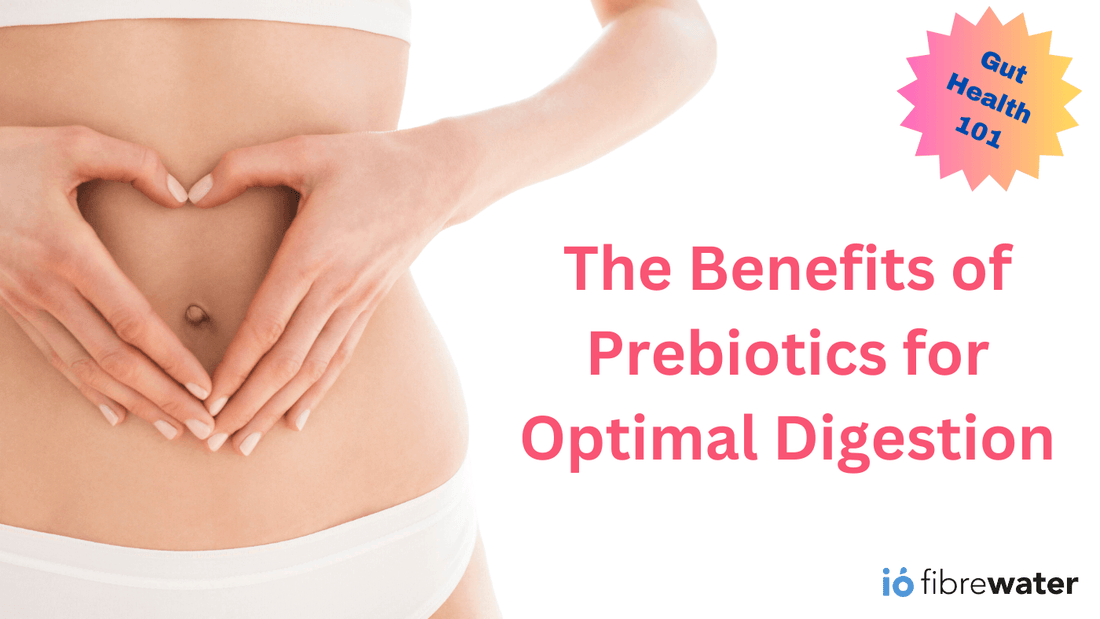Maintaining a healthy gut is essential for overall well-being, and one key factor in achieving optimal digestive health is the inclusion of prebiotics in your diet.
Prebiotics are a type of dietary fibre that nourish the beneficial bacteria in your gut, promoting a balanced and thriving gut microbiome.
In fact, many people find that after they started taking prebiotics daily, and in particular, prebiotic supplements to achieve the daily recommended intake, they were able to eat foods that were on the 'no-go' list, as well as significantly reducing/eliminating digestive health issues such as bloating, diarrhea, cramps, and acid reflux.
In this article, we will delve into the world of gut health, explore the remarkable benefits of prebiotics, and provide practical tips on incorporating them into your daily routine for improved digestion.
- Understanding gut health and its importance
- The role of prebiotics in nourishing the gut
- Benefits of prebiotics for digestive health
- Practical tips for incorporating prebiotics into your diet
- Achieving prebiotic precision nutrition - easily!
- Conclusion
Understanding Gut Health and Its Importance

The gut, often referred to as the "second brain," is a remarkable system that plays a vital role in our overall health and well-being.
It is responsible for breaking down food, absorbing nutrients, and eliminating waste. However, its functions go far beyond digestion.
The gut is also home to trillions of microorganisms, collectively known as the gut microbiome. This complex community of bacteria, viruses, fungi, and other microbes influences various aspects of our health, including digestion, metabolism, immune function, and even our mood and mental health.
The Gut-Brain Connection:
The gut and the brain are intricately connected through a bidirectional communication pathway called the gut-brain axis. This means that the health of our gut can influence our mental state and vice versa.

Research has shown that imbalances in the gut microbiome can contribute to conditions such as irritable bowel syndrome (IBS), inflammatory bowel disease (IBD), and even mood disorders like anxiety and depression.
Understanding the importance of gut health becomes paramount in maintaining our overall well-being.
Learn more about how prebiotics and mental well-being are linked in our blog, Prebiotics & Mood.
The Gut-Immune System Link:
The gut is also closely linked to our immune system. Approximately 70-80% of our immune cells reside in the gut.
A healthy gut microbiome helps train our immune system, ensuring it responds appropriately to threats while maintaining tolerance to harmless substances.

When the gut microbiome is imbalanced, it can lead to immune dysregulation and increase the risk of developing autoimmune diseases, allergies, and chronic inflammation.
Learn more about the gut-immune system link in our blog, 'Prebiotics & Immune System Function'.
The Role of Prebiotics in Nourishing the Gut
What are Prebiotics?
Prebiotics are a type of non-digestible fibre found in certain foods. Unlike probiotics, which are live beneficial bacteria, prebiotics are indigestible by humans but serve as a source of nourishment for the beneficial bacteria in our gut. They pass through the upper digestive tract without being broken down and reach the colon, where they are fermented by the gut bacteria.
Learn more about prebiotics by reading some of our blogs:
How Prebiotics Work:

When prebiotics reach the colon, they act as a selective fuel source for specific beneficial bacteria, such as Bifidobacteria and Lactobacilli.
These bacteria ferment the prebiotics, producing short-chain fatty acids (SCFAs), such as butyrate, acetate, and propionate. SCFAs provide energy for the cells lining the colon and have been associated with numerous health benefits, including reduced inflammation, improved gut barrier function, and enhanced absorption of minerals.
Benefits of Prebiotics for Digestive Health

Enhanced Digestion and Nutrient Absorption:
One of the primary benefits of prebiotics is their ability to improve digestion and nutrient absorption.
By nourishing beneficial gut bacteria, prebiotics promote a healthy gut environment, aiding in the breakdown and absorption of nutrients from the foods we consume. This can lead to more efficient digestion, reduced bloating, and improved overall nutrient status.
Alleviation of Digestive Discomfort:
Prebiotics have been shown to alleviate common digestive issues such as bloating, constipation, and diarrhea.

By promoting a balanced gut microbiome, prebiotics help regulate bowel movements and improve stool consistency. They can also reduce symptoms in individuals with irritable bowel syndrome (IBS) by modulating gut motility and reducing inflammation.
Support for Gut Barrier Function:

The gut barrier acts as a protective layer, preventing harmful substances, toxins, and undigested food particles from entering the bloodstream.
Prebiotics play a role in maintaining the integrity of the gut barrier by supporting the growth of beneficial bacteria that produce mucus and strengthen the tight junctions between the cells lining the intestinal wall.
This helps to prevent "leaky gut" syndrome, a condition where the gut barrier becomes compromised, allowing unwanted substances to pass through and trigger inflammation.
By supporting gut barrier function, prebiotics contribute to a healthier gut and reduced risk of digestive disorders.
Practical Tips for Incorporating Prebiotics into Your Diet

Eat prebiotic-rich foods
Including prebiotic-rich foods in your daily diet is an excellent way to support your gut health. Some common sources of prebiotics include:
- Onions, leeks, and garlic: These vegetables are rich in inulin and fructooligosaccharides (FOS), both potent prebiotics.
- Bananas: Ripe bananas contain resistant starch, a prebiotic fiber that becomes more abundant as bananas ripen.
- Jerusalem artichoke: Also known as sunchokes, these tubers are packed with inulin, providing a significant prebiotic boost.
- Whole grains: Oats, barley, and wheat bran are examples of whole grains that contain prebiotic fibers.
- Chicory root: This root vegetable is the best source concentrated source of inulin, making it a powerful prebiotic.
The International Probiotic and Prebiotic Association recommends eating 3-5g of prebiotics daily to achieve health benefits that go far beyond digestion, such as heart health, reducing the risk of type 2 diabetes and weight management. In fact, they are a natural contender for weight loss injections.
However, although the foods listed above contain prebiotic fibre, it isn't always easy to eat the amount of foods higher in prebiotics on a daily basis for most people. For example, you would need to eat two raw onions a day to achieve approximately 4g of prebiotics.
(There's a much easier way to boost your prebiotics! Keep reading to find out more below!)
Learn more:
Gut-friendly Prebiotic Recipe Ideas
Incorporating prebiotic-rich ingredients into your meals can be both delicious and beneficial for your gut health. Here are a few gut-friendly recipe ideas:
- Roasted Garlic and Onion Soup: Sauté onions and garlic, then blend with vegetable broth for a nourishing prebiotic soup.
- Banana and Oatmeal Breakfast Bowl: Combine ripe bananas, oats, and a sprinkle of cinnamon for a fiber-rich and gut-nourishing breakfast.
- Chickpea and Artichoke Salad: Toss together chickpeas, marinated artichoke hearts, mixed greens, and a tangy vinaigrette for a prebiotic-packed salad.
- Whole Grain Porridge: Cook a warm and comforting bowl of whole grain porridge using oats, barley, or quinoa topped with sliced bananas and a drizzle of honey.
(Check out an easy way below to boost your prebiotic fibre intake with some of these recipes even more!).
Achieving Prebiotic Precision Nutrition
ió fibrewater is the UK's first prebiotic fibre-infused water that delivers 100% of your daily prebiotic intake and 20% of your daily fibre intake, too.

Our research found that 75% of people who had existing digestive health issues experienced improvements within 12 days when drinking one bottle of ió fibrewater daily.
ió fibrewater is backed by UK & EU health claims for supporting proper gut function and digestive health, due to the prebiotic chicory root fibre.
Don't take our word for it! Our glowing reviews from real people says it all regarding how ió fibrewater is helping people with digestive health issues such as:
- Bloating & stomach cramps
- Acid reflux
- Regularity
- Food intolerances
Get a 15% discount off your next ió fibrewater order when your order directly from us by using the code, 'IOLOVER15'.
Ps. you can add ió fibrewater to your oatmeal, breakfast bowls or smoothies to boost your prebiotic fibre intake even more and ensure that you are getting your daily amount of prebiotics!
Conclusion
In conclusion, prioritising gut health is crucial for overall well-being, and prebiotics play a significant role in achieving optimal digestion.
By nourishing the beneficial bacteria in our gut, prebiotics support a balanced gut microbiome, leading to improved digestion, enhanced nutrient absorption, and strengthened immune function.
By incorporating prebiotic-rich foods into your diet or considering prebiotic supplementation, such as drinking ió fibrewater, you can take proactive steps toward better gut health and overall vitality.
Start harnessing the benefits of prebiotics today and experience the transformative power of optimal digestion!





